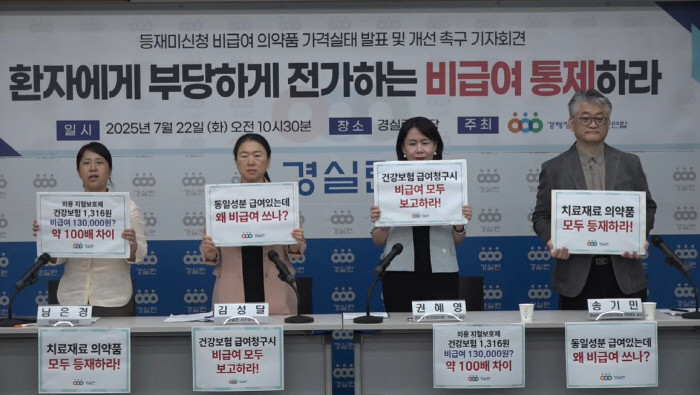Increasing patient cost burden...Citizens' Coalition for Economic Justice announces price status of unregistered non-paying drugs and urges improvement
Jul 22, 2025
|
The Citizens' Coalition for Economic Justice stated that `Health insurance medical expenses are increasing every year, but the health insurance coverage rate is in the low 60% range. The increase in the amount of medical care, such as aging, and the increase in indiscriminate high-priced and excessive non-payment treatment are blamed, but the government's non-payment price management is only a passive measure"We announce the results of the survey to urge the implementation of effective non-payment management measures" he said.
The financial expenditure of health insurance has doubled from 50 trillion won to more than 100 trillion won in the last 10 years (2013-2022), and the proportion of health insurance covered by the total medical expenses has stagnated in the early 60% range. In order to lower the direct burden of medical expenses by increasing Korea's health insurance coverage rate, which is the lowest among OECD countries, strict management of the conversion of essential medical care benefits, reckless use of non-payments, and high prices is necessary.
In the case of drugs, unlike behavioral and therapeutic materials, suppliers are not obligated to apply for non-payment decisions, and it is suspected that medical institutions exploit institutional loopholes to avoid listing products identical or similar to benefits, and that medical institutions profit from patients with high-priced non-benefits instead of benefitsHe argued that the government should come up with measures because unregistered non-paying drugs worsen the coverage of health insurance, increasing the burden of national medical expenses and encouraging unethical behavior of companies.
To support this, the Citizens' Coalition for Economic Justice investigated external hemostatic aids and external local anesthetics, which are used in a mixture of benefits and non-benefits due to the nature of medical materials accompanying medical practice, and analyzed how much the cost is passed on to patients and management square problems compared to the application of the non-benefit management system and the price status (highest, lowest, average, central), non-benefit prices and salary estimates.
As a result of a comparative analysis of benefits and non-paying drugs with the same ingredients and efficacy, the average price of hemostatic supplements was 2~228 times higher than the salary estimate and the median price was 2~237 times higher. In addition, as a result of investigating the cost of non-payment of local anesthetics notified by higher general hospitals, the price difference was 13.4 times to 31.1 times less than the salary estimate.
In response, the Citizens' Coalition for Economic Justice is undermining the security and stability of health insurance by using non-payment products with the same or similar ingredients instead of benefit products covered by health insurance due to the nature of treatment materials. It is suspected that companies and medical institutions benefit dozens of times from patients by using products with different specifications and materials and the same ingredients and efficacy as non-benefitsThe Ministry of Health and Welfare should investigate whether medical institutions have charged patients unnecessary medical expenses by exploiting this in a situation where it is not easy to provide sufficient information or consent to patients, and come up with measures such as confirmation procedures. The current notification system for non-payment price management has no punishment clause if not notified, the price disclosure system has a low utilization rate due to difficulty in price comparison, and the reporting system is ineffective because it can only identify some item data.
Accordingly, medical institutions should be required to report all non-benefits when claiming benefits, and he pointed out that for the stable operation of the health insurance system, it is necessary to comprehensively manage whether non-benefit treatment along with health insurance treatment is appropriate. In addition, he stressed that external hemostatic supplements, which are licensed as drugs and used as non-benefits, are classified as medical devices (therapeutic materials) in most countries, so the Ministry of Food and Drug Safety's approval stage and registration procedures should be prepared.
In this regard, the Citizens' Coalition for Economic Justice called for a full investigation into the status of non-payment of unregistered drugs, recovering unfair profits, and preparing measures to strengthen non-payment management.
This article was translated by Naver AI translator.














